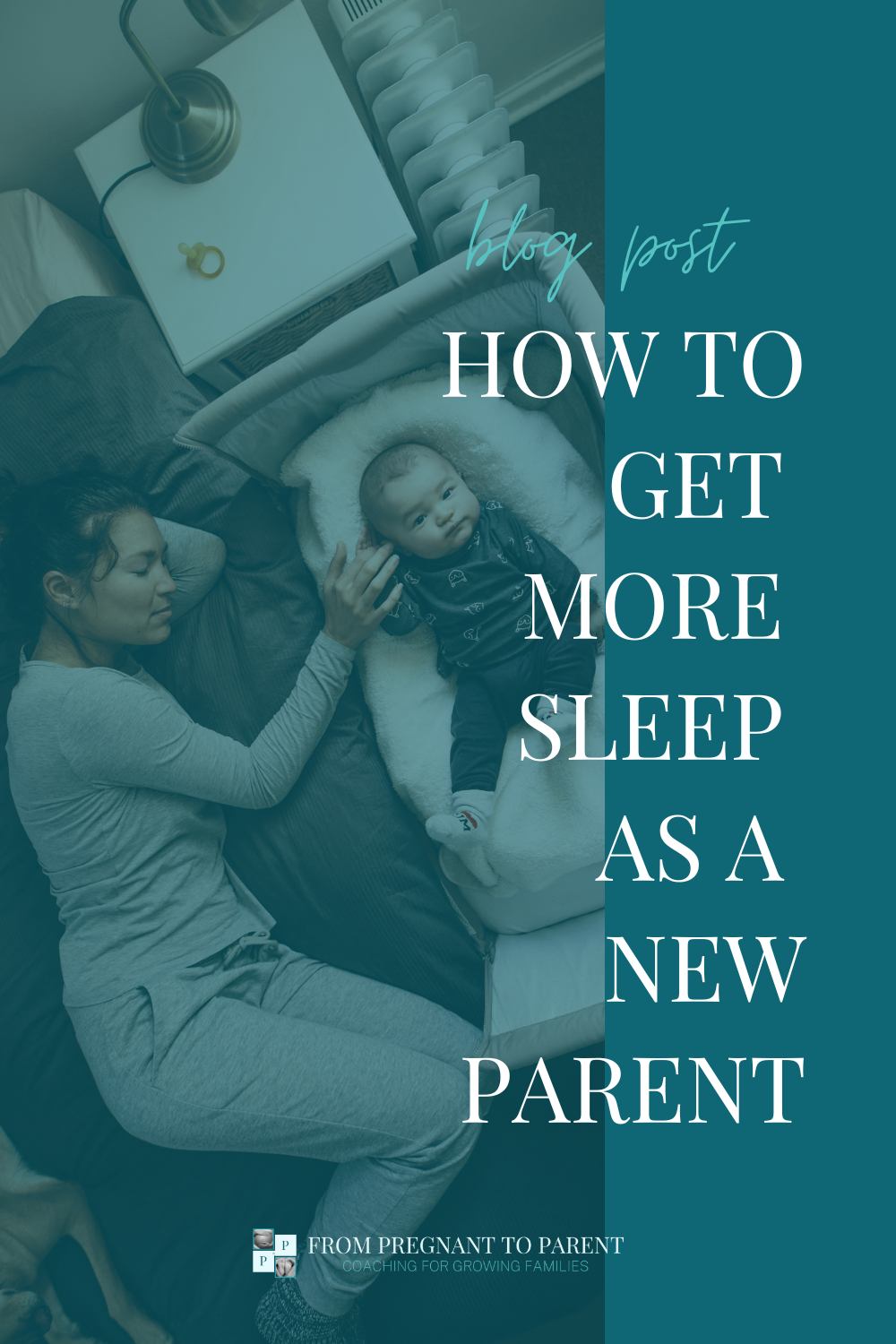
Are You a New Parent? Here’s How to Get Better Sleep
Let’s talk about a topic near and dear to my heart: sleep for new parents. I didn’t realize how important sleep was for my body and mind until I wasn’t getting enough of it.
At the very end of my first pregnancy, I remember going to bed each night thinking, “This might be my last full night’s sleep for a long time.” Each morning, I would wake up surprised to find that my labor still hadn’t started. This cycle of “last full nights” repeated until my baby finally arrived (two weeks past his estimated due date).
Logically, I knew life would be exhausting. In reality, I had no idea the toll postpartum sleep deprivation would take on my physical and mental health.
My Story
I would describe my firstborn baby’s sleep as fairly typical for a newborn: fragmented and highly unpredictable. I did my best to follow the popular advice to “sleep when the baby sleeps,” but I found it hard. I’ve never been good at napping, and despite being exhausted, I couldn’t easily fall asleep. Instead, I prioritized other things such as daily household tasks, pumping, and re-running the same load of laundry (for the third time).
Then one day I totally lost it on my husband. He came home from work 5 minutes later than he initially told me he would. It was just 5 minutes, but at that moment, it felt like an eternity. I couldn’t take one more minute alone with a fussy baby. The lack of sleep had finally caught up with me in the form of postpartum rage, fits of crying, and not being able to enjoy time with my son. And I finally snapped.
That was my wake-up call that something was off and I needed support. It took time, but eventually, I prioritized my mental health and well-being. I asked for the help I needed and slowly started to heal. Looking back, it’s easier to see the way sleep deprivation contributed to my postpartum depression.
A Second Chance
When I found out I was pregnant with our second baby, I focused on creating a postpartum experience that looked and felt different. This time, I knew I was at risk for postpartum depression, so I took my mental health very seriously.
Through my first experience as a new parent, I identified a critical area I knew I needed to be more intentional about: my own sleep. Before my second child was even born, I created a postpartum plan.
This time around, rather than trying to do it all, I tried to get more comfortable asking for and receiving help. My partner was able to take a longer paternity leave. We recruited the help of family members. And we also hired a wonderful night doula. At times, leaning on others was excruciatingly hard for me, but I knew my mental health (and my family) needed me to accept the help.
Prioritizing My Own Sleep
As a second-time mom, I was also more aware of the signs that I needed to prioritize my sleep and well-being. I was able to show up for myself in an intentional way, and it made a big difference. I’m not saying that those early days/weeks/months were easy. (They were still an emotional rollercoaster, and I still experienced plenty of sleep deprivation.) However, being more attuned to my own needs helped me find much more enjoyment and satisfaction during my second fourth trimester experience.
Trust me when I say I get it. It’s hard to put ourselves first as parents (especially our sleep). But we have to! Parenting is a marathon, not a sprint. You need to conserve yourself as the vital resource you are. For you, your baby, and your family.
Your Fourth Trimester Sleep Strategy
So, how exactly do you prioritize your own sleep as a new parent? If you’re pregnant, now is a great time to think through a postpartum sleep plan. If you’re already in those grueling first weeks and months of parenthood, it’s not too late to try something new.
Keep reading to learn why sleep matters, the signs of sleep deprivation, and ideas for how to get more sleep during those first twelve weeks (and beyond).

Sleep, Beautiful Sleep: Why It Matters
We’ve all heard that sleep is important. It’s essential for various aspects of brain function including concentration and productivity as well as problem-solving skills and memory performance. Sleep can also help lower stress. It allows your mind and body to relax and recover from your day. And, it also supports healthier circulatory and immune systems.
All things that are pretty important for parenting, right? Cue life with a newborn….
Newborn Sleep Patterns
Many expecting parents are aware (at least to some degree) of the sleep deprivation often associated with newborns. What you may not realize, however, is that babies are born without an internal clock (known as a circadian rhythm). In fact, most babies actually start life with their days and nights reversed. It’s normal if your baby sleeps all day and parties all night when they first come home.
Newborns also spend more time in “active sleep” than “quiet sleep,” experience shorter sleep cycles, and struggle to connect those sleep cycles. As a result, they wake up more frequently.
Biologically, this is a great thing for our newborns and their survival. After all, newborns need to eat every 1 – 3 hours (approximately 8 – 12 times a day). For parents, however, this is a huge disruption to our own sleep patterns.
Signs and Symptoms of Sleep Deprivation
As you can imagine, life with a newborn can easily lead to exhaustion. Sleep deprivation has negative impacts on a person’s general health and well-being whether they’re a new parent or not.
Here is a list of the common effects and symptoms of sleep deprivation from the Sleep Foundation:
- Irritability, anger, and/or rage
- Increased anxiety
- Low mood or depression
- Brain fog, trouble concentrating, and slow reaction times
- Higher levels of stress
- Difficulty regulating and controlling emotions
- Lowered resilience and the capacity to handle challenges throughout the day
- Less patience and more reactivity
- Difficulty concentrating or remembering things
- Spending more than 30 minutes falling asleep
- Difficulty staying asleep (frequently waking)
- Feeling tired in the morning even after a full night’s sleep
Sleep Deprivation and Postpartum Depression
Not surprisingly, sleep deprivation can also worsen symptoms of postpartum depression which affects one in eight new mothers and one in ten new fathers. Although suffering through sleep deprivation is sometimes seen as a rite of passage for new parents, it doesn’t have to be.
As psychotherapist and founder of Happy as a Mother, Erica Djossa, shares: “Sleep is one of the most foundational self-care needs in the early days of motherhood. Planning for and prioritizing sleep can even prevent or greatly improve mental health challenges such as postpartum depression and anxiety.”
I’m not promising that you’ll sleep like you did before your baby arrived, but with some intentional planning and prioritizing, you will get more of the restorative, protective sleep that is essential to your well-being.
New Parent Sleep Goals
In an ideal world, we would all get the recommended 7 – 9 hours of sleep every night. When you bring home your brand-new baby, it just isn’t realistic to expect that kind of consecutive sleep. Your goal throughout the newborn phase (and beyond) is to get at least one stretch of 4 – 6 hours of consecutive, uninterrupted sleep every 24 hours. This might not be attainable each night (especially early on), but you can start by aiming to hit this goal at least one night a week.
In addition to your one continuous stretch of sleep, you should aim to get as many “total hours” of sleep as you can to help compensate for sleep debt. While you’re getting less sleep, rest and nap as often as you can.
Prioritizing Rest and Naps
While naps aren’t equal to uninterrupted sleep at night, they can help to give you the boost you need to make it through the day. Studies show even a 10 – 20 minute nap can increase working memory, learning, and mental acuity for a few hours.
Take the pressure off of your naps by giving yourself permission to simply rest with your eyes closed instead. Feel free to play relaxing music, meditate, or listen to a podcast or audiobook while you rest. Just make sure it’s something you could fall asleep to. Who knows, you may even drift in and out of light sleep without being fully aware you snagged some much-needed sleep.
But what about the laundry, dishes, and other adult responsibilities? Make sleep your priority for at least the first 4 – 12 weeks of your baby’s life.
In order to prioritize sleep, you will likely need to give something up or let go of a task on your “to-do list.” This can feel like a big shift (I know it was for me), but we promise adulting can wait. Give yourself permission to rest!
Split Nighttime Parenting Duties
I suggest thinking through nighttime parenting responsibilities BEFORE your baby’s arrival. How will you (and your partner if you have one) navigate nights? Those middle-of-the-night wakeups can feel hard, overwhelming, and just plain exhausting. The early weeks are especially hard when your newborn is eating every 1 – 3 hours, even at night.
Until your baby starts sleeping longer stretches, nighttime parenting will require some creative problem-solving to ensure you get the sleep you need. If you can help it, nights shouldn’t be a one-person job.
Consider breaking up the night into shifts. Here’s an example of what this could look like:
- Baby goes to bed around 8:30 pm and wakes every 1 – 3 hours.
- One caregiver goes to sleep at 8:30 p.m. while another caregiver is responsible for the baby’s needs until 1:00 a.m.
- Baby wakes around 11:00 p.m. Caregiver 2 handles the feeding, soothing, and getting baby back down.
- At 1:00 a.m., caregiver 2 puts the monitor by caregiver 1 so they can continue sleeping until the baby wakes up again. Caregiver 2 goes to bed.
- When the baby next awakes at 1:30 a.m., caregiver 1 takes over after 5 hours of consecutive sleep. Caregiver 1 takes care of all of the baby’s needs until at least 6:00 a.m. when caregiver 2 has also gotten 5 hours of consecutive sleep.
Keep in mind, this is just one example of what “split shifts” could look like. The exact timing of each shift and how you handle transitions will look unique to you, your baby’s habits, and your situation. We’re here to help if you need ideas!
If you’re feeling unsure about splitting the night with your partner, this section is for you. Oftentimes, primary caregivers become the “default parent” for hard tasks. This can happen simply because they have more practice and therefore tend to have an easier time soothing and caring for the baby. Taking shifts gives your partner or another support person the opportunity to feel more involved and ultimately more confident in their ability to soothe and care for your baby, which furthers their connection and bonding–a true win-win.

Sleep and Breastfeeding
Splitting the night into shifts can feel particularly tricky if you’re breastfeeding, but sharing the load is still possible. Here are a few tips to consider:
- Replace one feeding with a bottle of formula or expressed milk. In an article for the Washington Post, Dr. Nicole Leistikow, a reproductive psychiatrist, shares: “Having a loving person take over one or two feedings does not impair mother-baby bonding. Postpartum depression does. Use whatever combination of breastfeeding, pumping, and formula protects you and your baby together.”
- If your milk supply wakes you up from discomfort or leaking, consider pumping or hand-expressing when you are awakened. Delay pumping by 30 minutes every few nights to extend the length of time from the last pump or feeding. This helps train your body to allow for one stretch of 4 – 5 hours between letdowns. If you are worried about your milk supply, consider adding a pumping or feeding session during the day or working with a certified lactation professional to help you find the right schedule for your supply.
- If you prefer to exclusively breastfeed, have your partner or another support person take care of everything but the feeding during their shift. When your baby wakes, they can change their diaper, bring them to you to breastfeed in bed, and then burp the baby and get them back down. This allows you to stay in bed, maybe even laying down, so your sleep is minimally disrupted.
- You can also get creative about when you have any extra support. Maybe it works better for your family to have someone take over for 4 – 5 hours early in the morning or in the afternoon/evening. When you’re getting sleep isn’t as important as the fact that you’re getting sleep, period.
Using a Protected Sleep Room
Unlike adults, babies spend more time in light “active sleep” rather than deeper “quiet sleep.” As a result, more babies, especially newborns, are noisy sleepers. They move around, grunt, coo, and even cry out–all while still being fast asleep. This can be especially hard for primary caregivers and light sleepers to tune out, which leads to even more sleep disruptions.
I’ve seen the use of a protected sleep room change the game for many families, especially while room sharing. The idea is that the caregiver “on duty” sleeps in the room with the baby while the “off duty” caregiver sleeps in a separate, quiet room to help protect their sleep from disruption by your noisy, new baby. This could be a separate bedroom, living room, office, or any other quiet room in your home that’s conducive to sleep.
When it’s time to switch, the “on duty” caregiver comes into the protected room to leave the monitor nearby or open the door. That way, when the baby stirs again, the previously “off duty” caregiver knows they are now back on duty. Look back at the example above if you need a clearer idea of what this could look like with split shifts.
If you’re a particularly light sleeper (or you don’t have a separate space you can use for sleep), you may need to invest in some earplugs, a sleep mask, blackout curtains, and/or a sound machine to help protect your sleep while you’re “off duty.”
Getting Sleep as a Solo Parent
If you’re a single parent or your partner isn’t able to help with nighttime parenting, it’s crucial to have a plan for nighttime help. Ideally, you’ll want to set up some kind of regular support you can count on. Even just one night a week can be a game-changer.
At the very least, come up with a plan for who can support you when you’re feeling particularly rundown. Proactive planning takes some of the guesswork out of asking for help, which can help you avoid a mental health crisis.
So, who can you recruit to stay the night when you need support with night feedings? This could be unpaid support (e.g., a partner, family members, friends, or neighbors) or paid support (e.g., a night nurse, doula, or babysitter).
Remember, night support isn’t the only option. You can also consider pairing up with a neighbor or friend to give each other regular breaks during the day. Other parents and caregivers can be great sources of support! Get together and take turns watching the kids so you can each get in a nap, shower, cook meals, and enjoy parenting in a community.
You’ve Got This!
Now that you are armed with ideas, it’s time to reflect. Think through your situation and family dynamics to create your own unique sleep plan. A little planning now will make a big difference later, especially when you hit peak exhaustion as a new parent.
Need help applying this advice to your unique situation? We’ve got you covered! At From Pregnant to Parent, our team of professional, caring coaches offers individual and group coaching to support growing families. Click here to set up a call with one of our coaches.
Additional Sources:
- Sleep Foundation, How Does Being a New Parent Affect Sleep?
- Sleep Foundation, Sleep Deprivation and Postpartum Depression
- CDC Reproductive Health, Depression Among Women
- Healthy WA, Sleep 0 – 3 Months
- HealthyChildren.org, Sleep
- PSI CT Chapter, Sleep? With a New Baby?! Protected Sleep as an Aspect of Self-Care
- About the Author
- Latest Posts

Christina is a Licensed Marriage and Family Therapist with a private therapy practice in Marin County (San Francisco Bay Area). Christina specializes in maternal mental health and supporting individuals through their perinatal and parenting journey. As a mother of two young boys, Christina knows firsthand the joys and demands that parenthood brings. While Christina has held a long-standing interest and focus in reproductive and maternal mental health, it was through her own experience in becoming a mother that awakened a newfound dedication and calling for helping others in their parenting journey. When she isn’t in the office, you can find Christina chasing after her two active boys, spending time with her partner, reading, and watching reality TV (most notably Bravo).
December 18, 2022
Christina Klein, LMFT
A Note About Links: Our blog is reader supported. When you buy a product through the links on our site, we may earn a small affiliate commission. We promise, we only recommend products we genuinely like. Purchasing through our links doesn't effect the price you pay, but it does help to support our small business.
Leave a Reply Cancel reply
FTC Affiliate Disclosure: When you purchase through the links on our site, we may earn an affiliate commission at no extra cost to you. By doing so, you don't pay a higher price, but you do help to support our small business. If we ever promote something that was gifted to us, we'll be sure to say so. Regardless of whether or not we are earning a commission, we promise, we will only ever recommend products we genuinely like and use (or would use) ourselves.
Follow Me
On Instagram
Tips | Updates | Behind the Scenes
CLick Here
RESOURCES
RESOURCES
CONTACT
CONTACT
FOR PARENTS
FOR PARENTS
FOR PREGNANCY
FOR PREGNANCY
GET TO KNOW ME
HOME